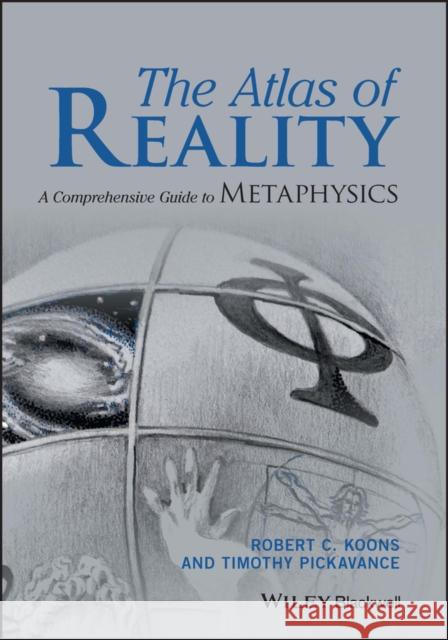The Atlas of Reality: A Comprehensive Guide to Metaphysics » książka



The Atlas of Reality: A Comprehensive Guide to Metaphysics
ISBN-13: 9781119116264 / Angielski
The Atlas of Reality: A Comprehensive Guide to Metaphysics
ISBN-13: 9781119116264 / Angielski
(netto: 177,02 VAT: 5%)
Najniższa cena z 30 dni: 183,21
ok. 30 dni roboczych.
Darmowa dostawa!
Acknowledgements xviiPart I Foundations1 Introduction 31.1 A Brief History of Metaphysics 31.2 Why Do Metaphysics? 51.3 How to Use the Book 92 Truthmakers 132.1 Introduction 132.2 Five Arguments for Classical Truthmaker Theory 192.3 The Challenge of Deflationism 252.4 Truthmaker Maximalism 302.5 Alternatives to Truthmaker Maximalism 362.6 Conclusion and Preview 44Notes 453 Grounding, Ontological Dependence, and Fundamentality 473.1 Is Grounding Real? 493.2 Relation between Grounding and Truthmaking 553.3 Relation between Grounding and Ontological Dependence 583.4 Conceptual vs. Extra-Conceptual Grounding 623.5 Alternatives to Grounding? 653.6 Can Grounding Relations be Grounded? 693.7 Connections between Grounding and Entailment 713.8 How is Grounding Different from Causal Explanation? 723.9 Conclusion: Grounding and Ontological Economy 72Notes 73Part II Dispositions4 Conditionals 774.1 Counterfactual Conditionals: Semantics, Logic, and Metaphysics 784.2 Hypotheticalism 844.3 Anti-Hypotheticalism and Laws of Nature 864.4 Strong Hypotheticalism: Counterfactual Accounts of Powers and Dispositions 90Notes 925 Laws of Nature 945.1 Strong Nomism: The Dretske-Armstrong-Tooley (DAT) Theory of Laws 945.2 Neo-Humeism: Reduction of Conditionals, Laws, and Powers 99Notes 1056 Powers and Properties 1066.1 Advantages of Strong Powerism 1066.2 The Individuation of Properties 1086.3 Objections to Strong Powerism 1186.4 Conclusion 121Notes 121Part III Universals and Particulars7 Universals 1257.1 Introduction 1257.1.1 What properties must explain 1267.2 Realism 1287.3 Universals and the Problem of Intentionality 1427.4 Properties as the Ground of Causal Powers 145Notes 1458 Reductive Nominalism and Trope Theory 1478.1 Reductive Nominalism 1478.2 Trope Theory 1658.3 Conclusion 169Notes 1699 Particulars and the Problem of Individuation 1719.1 Introduction 1719.2 Facts 1729.3 Substances 175Notes 20010 Relations, Structures, and Quantities 20110.1 Accounts of Relational Facts 20110.2 Non-Symmetrical Relations and the Problem of Order 20610.3 Structural Universals and Constituent Ontology 21510.4 Determinables, Quantities, and Real Numbers 21910.5 Conclusion and Preview 225Notes 225Part IV The Nature of Reality11 Nihilism and Monism 22911.1 Nihilism and Aliquidism 22911.2 Monism 237Note 25212 The Non-Existent and the Vaguely Existing 25312.1 Does Everything Exist? 25312.2 Ontic Vagueness 27112.3 Conclusion 28013 Solipsism, Idealism, and the Problem of Perception 28113.1 Defining the Mental and the External 28213.2 Solipsism and Phenomenalism 28413.3 Theories of Perception 28613.4 Arguments against Phenomenalism 30613.5 Arguments against Solipsism 30913.6 Conclusion and Preview 312Notes 313Part V Modality14 Possibility, Necessity, and Actuality: Concretism 31714.1 Introduction 31714.2 Concretism:Worlds as Universes 32114.3 Problems for Concretism 32714.4 Conclusion 331Note 33115 Abstractionism:Worlds as Representations 33215.1 Magical Abstractionism 33315.2 Structural Abstractionism 34115.3 Aristotelian Theories of Possibility 34815.4 Conclusion 350Note 35116 De Re Modality and Modal Knowledge 35216.1 Modality De Re: Transworld Identity and Counterpart Theory 35216.2 Modality and Epistemology: Possibility and Conceivability 36316.3 Conclusion 369Notes 369Part VI Space and Time17 Is Space Merely Relational? 37317.1 The Nature of Location 37317.2 Spatial Substantivalism 37517.3 Spatial Relationism 38117.4 Absences and Vacuums 38617.5 Conclusion 388Notes 38918 Structure of Space: Points vs. Regions 39018.1 Constructing Points from Regions 39118.2 Points vs. Regions 39418.3 Arguments against Points as Fundamental 39718.4 Voluminism vs. Volume-Boundary Dualism 40818.5 Conclusion 414Note 41419 The Structure of Time 41519.1 Is Time Composed of Instants or Intervals? 41519.2 Instants as Dependent Entities 42519.3 Does Time have a Beginning? 42719.4 Conclusion 42920 Time's Passage 43020.1 Tensers and Anti-Tensers 43220.2 Varieties of Anti-Tensism 43520.3 Varieties of Tensism 43720.4 Presentism 43920.5 Arguments for Tensism 44220.6 Conclusion 456Note 45721 Arguments for Anti-Tensism 45821.1 How Fast Does Time Flow? 45821.2 Truthmakers for Truths about the Past 46121.3 The Theory of Relativity 46921.4 Epistemological Problems for Tensism 47321.5 McTaggart's Paradox 47421.6 Brute Necessities of Time 47621.7 Conclusion 478Part VII Unity22 Material Composition: The Special Question 48122.1 The Existence of Composite Things 48222.2 Are Composite Things an "Ontological Free Lunch"? 48222.3 Redundancy 48522.4 Fundamental Heaps 49022.5 Fundamental Artifacts 49722.6 Living Organisms vs. Mereological Nihilism 49922.7 Finding an Intelligible Principle of Composition 504Notes 51323 Composition: The General Question 51423.1 Formal Mereology: Le´sniewski, Goodman, and Leonard 51423.2 Three (or Four) Answers to the General Composition Question 51823.3 Accounting for the Correct Principles of Mereology 52323.4 Parthood and Truthmaking 529Notes 53024 Change and Persistence 53124.1 Does Anything Change? Does Anything Persist? 53224.2 How Objects Change Properties: Substratism vs. Replacementism 53724.3 The Metaphysics of Motion 551Notes 55425 The Persistence of Composite Things 55525.1 Mereological Constancy and Inconstancy 55625.2 Coincident Things 56425.3 Conclusion 573Note 574Part VIII Causation26 The Existence and Scope of Causation 57726.1 Are there Causes? 57726.2 The Scope of Causation 583Note 58927 Causation: A Relation between Things or Truths? 59127.1 Causal Explanationism 59227.2 Causal Connectionism 605Notes 61128 Discrete and Continuous Causation 61328.1 Is All Causation Discrete? 61428.2 The Nature of Discrete Causation 61428.3 Is All Causation Continuous? 61628.4 The Nature of Continuous Processes 61828.5 Processes and the Direction of Continuous Causation 62128.6 Are Processes an Exception to Hume's Epistemic Principle? 62228.7 Conclusion: The Consequences of Causation 623Notes 62329 Conclusion: The Four Packages 624Appendix A 633Appendix B 651References 655Index 671
ROBERT C. KOONS is a Professor of Philosophy at the University of Texas at Austin. He is the author of Paradoxes of Belief and Strategic Rationality (1993) and Realism Regained (2000), co-author of Metaphysics: The Fundamentals (with Tim Pickavance, 2014), and co-editor of The Waning of Materialism (with George Bealer, 2010).TIMOTHY PICKAVANCEis an Associate Professor and Chair of the Talbot Department of Philosophy at Biola University. He is co-author of Metaphysics: The Fundamentals (with Robert Koons, 2014).
1997-2026 DolnySlask.com Agencja Internetowa
KrainaKsiazek.PL - Księgarnia Internetowa









